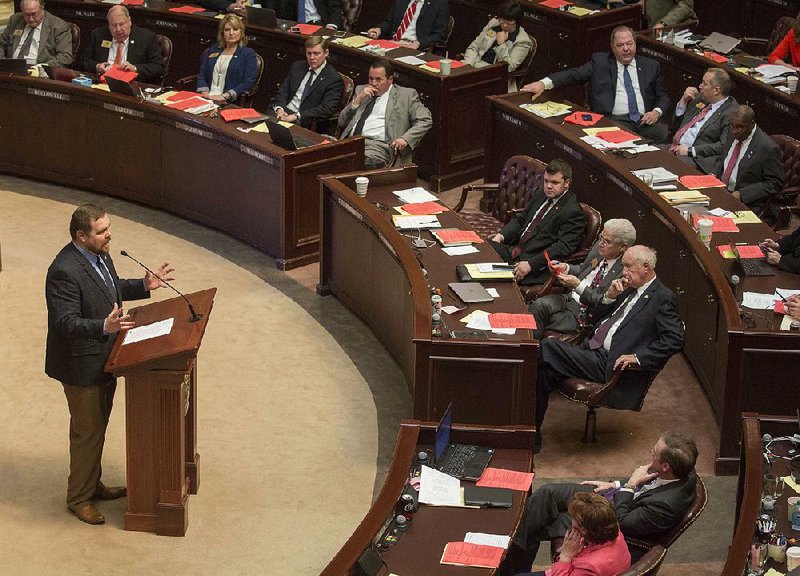A proposed amendment to the state constitution aimed at making it harder to amend the constitution in the future received broad support from House lawmakers Monday.
The House voted 79-10 to adopt House Joint Resolution 1003, sponsored by House Speaker Jeremy Gillam. If adopted in the Senate, the resolution would place the proposed constitutional amendment on the ballot for voters to consider in the November 2018 general election.
In that election, a simple majority of voters could approve the proposed amendment. If HJR1003 is enacted, any future constitutional amendment would require approval by 60 percent of voters.
The proposed amendment also would add to the requirements of petitioners working to get initiated amendments on the ballot. Petitioners would have to gather signatures from at least 25 counties, instead of the current 15.
Also, lawmakers would face a higher threshold for getting their proposed amendments on the ballot. Both chambers would have to approve a proposed amendment by a two-thirds majority, rather than the current simple majority.
Rep. Bob Ballinger, R-Hindsville, the co-sponsor of the resolution, presented it Monday to the House. He told lawmakers that they would be making it harder for the public and themselves to change the state's constitution, which dates to 1874.
Since 1874, 98 amendments have been added to the constitution.
"What we're trying to do is create a more stable constitution, one that isn't easily changed," Ballinger said.
The four most recent amendments, passed in November 2016, included a voter-referred amendment to legalize medical marijuana.
That proposal passed with 53 percent of the vote, despite a large majority of lawmakers and others who publicly opposed it.
Before the election, the Arkansas Supreme Court ruled that three measures did not meet the requirements to be put to a public vote, but that ruling came after printing of ballots had started across the state.
One of those proposals, Issue 5, would have amended the state constitution to authorize up to three casinos to be run by companies controlled by Missouri businessmen. The amendment proposed by HJR1003 states that no business or person can be written by name into the state constitution.
Gillam, a Republican from Judsonia, told reporters that his proposed resolution was not drafted in response to the results of the November election, but it did take into consideration concerns voiced by voters during last year's campaign.
"A lot of this was born long before the election results actually happened," Gillam said. "You had individuals that were basically coming in and, from the public's perception, were just buying a constitutional amendment."
In committee, the resolution was opposed by the conservative religious group Family Council, which has led previous campaigns to have amendments placed on the ballot. Family Council President Jerry Cox said the proposed amendment would make it harder for grass-roots efforts to get amendments on the ballot.
One of the 10 House lawmakers who voted against the resolution, Rep. Warwick Sabin, D-Little Rock, said he had similar concerns.
"The threshold for citizens to get a constitutional amendment on the ballot is already pretty laborious," Sabin said, "I think [HJR1003] tilts the balance more toward the Legislature than it does the citizens."
The law also changes part of the process for initiated acts. Petitions for any statewide ballot measure would have to be submitted 180 days before an election, instead of four months before.
Under HJR1003, an initiated act could still become law with a simple majority of votes.
A Section on 03/28/2017


